By Barry Zander, Edited by Monique Zander, the Never-Bored RVers
COMMENT FROM BARBARA — I started reading your blog (about our Canadian Atlantic Provinces trip) at the beginning, but due to deaths in my family and my husband’s I was unable to read them all, is there a way I can go back and catch up? And can you give me an idea of the cost of one of these caravans. Due to our mothers’ health we haven’t been camping a lot but hopefully when rested we will plan a trip. Thanks and have a blessed day.
BARRY’S RESPONSE — You’ve asked the right question, but a bit prematurely. I am finally getting to the point when I can start putting all my blogs on my own website. I’ll start in the week ahead publishing them on ontopoftheworld.bz beginning with all the Maritimes blogs and following up with those from our trip from California to Maine, where we met the caravan.
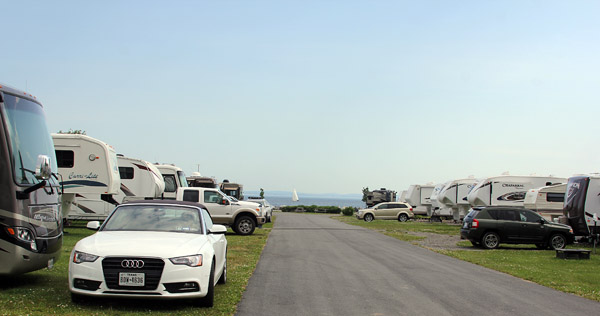
Looking seaward from our RV campground in New Brunswick, Canada
As for the cost, it varies widely, depending on the number of days and where you go. The major companies are glad to give you the cost online or over the phone and explain the choices. Add to that the cost of fuel and meals (which you would have anyway), and it’s not cheap. But I honestly believe you get good value for your investment in a caravan. Just about every time we mention having traveled with an RV caravan, the response is something like, “Oh, I like being independent.” I assure you, that’s our style, too, and the thought of being ducks following Mama made us cringe. But, it was a misconception.
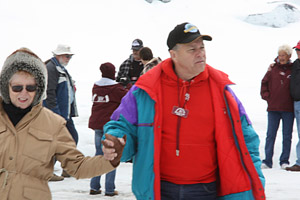
Dee and Marv on thick ice on the Columbia Ice Fields in Western Canada. We probably wouldn’t have paid the money, but it was included in the price of the caravan.
At this point, a disclaimer: we are not affiliated with any RV tour company. We have traveled with Adventure Caravans to Alaska and with Fantasy RV Tours to the Atlantic Provinces of Canada. We have not traveled with any of the others, and we can assume that most are as competent as those we experienced and their prices are competitive. Why do we think they are competent? Because, like the ones we signed on with, many of our travel companions seem to sign up again and again with the same companies; at least, that’s what we derive from talking to those with Adventure, Fantasy, Yankee Tours and others whose paths we’ve crossed. Honestly, most of the companies’ trips seem to hit the same “hot spots” and stay at the same RV parks, at least in the “ends of North America” where we’ve traveled.
Our caravans have been made up mostly of couples, a few of whom are long-time friends who share the wanderlust and willing to share costs. We’ve had singles
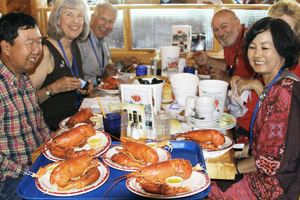
Everyone having fun … except, of course, the main course
on-board, folks who appreciated the opportunity to travel alone to interesting places and at the same time join others of like minds. For us, we will consider traveling in a caravan for special trips like the two we signed up for; plus, we did a Mardi Gras Rally (where we parked our rig in one place and were taken through traffic to parades and to New Orleans-area cultural sites via tour bus. Saves on fuel and the hassle of parking).
Other than the misleading concept that a caravan involves following the leader, the other main objection is cost – it’s cheaper on your own – and that’s correct, but I’ll argue in favor of “value” for dollar spent. For our investment, at most campgrounds we stayed in quality RV parks (where available – and when they’re not, it’s part of the adventure). We were treated to some meals (this is one feature where a difference in tours arises), had expensive ferry rides and boat tours included, and had prime reserved seats at shows and events. That all costs money. The longest we stayed in any one place on our journeys was five days, but most were two days – and that was almost always long enough to get to know the area. We were given adequate opportunities to explore on our own between planned tours and events. For example, in the Canadian
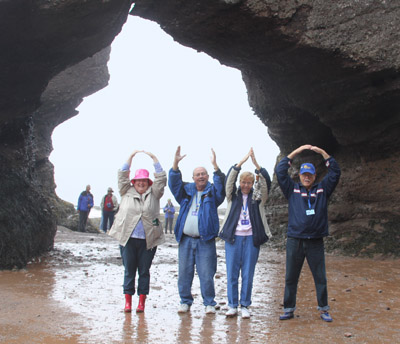
They’re a long way from Ohio, but enjoying the Hopewell Rocks on the Bay of Fundy
Maritimes, two members of our party had time to visit out-of-the-way villages in search of their ancestors. There was also time for not-included charter boat fishing trips and golf games.
Our strongest reasons for appreciating the caravan concept is that: 1) the schedule guides travelers to the most interesting places, and 2) they avoid places that would be a waste of time. Members of the troop receive a guidebook of what’s along the way and around the towns on our itinerary. You can choose where you want to go and what to avoid.
Guidebooks mainly instruct drivers on how to get from one RV park to the next, which can be complicated, but there’s lots of other information included, like where to refuel and recommended places to see and eat.
Individual caravans have a “Wagonmaster” and a “Tailgunner,” each being a couple, at least in our experience. The wagonmaster has numerous roles, like organizing the days’ activities, including coordinating with tour guides, buying blocks of tickets for shows, and that sort of thing. The wagonmaster is the first to leave each morning so he and she can be the first in the next campground to manage the parking. The tailgunner
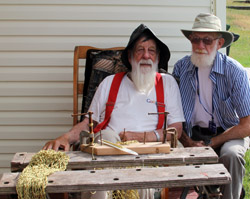
Chet Bucknam, right, bears a resemblance to vintage Maritimes fisherman Emard Court
follows the group to be available in case of breakdowns or problems along the road, and also supports the wagonmaster for RV park socials and events.
Some of the folks from our two caravan experiences have been on numerous trips, usually with the same company, which earns them rewards and discounts. When I say numerous, I’m talking about 10 or more excursions
Of all the benefits, I would say our main reasons for traveling with caravans is, first, to simplify the planning. It’s all inclusive. Secondly, because we are exposed to so many experiences that allow us to get to know interesting places and area natives. And third, having pre-paid for the entire trip, we go on boat rides, tours and to events that we would probably choose to miss rather than shell out the money, and nine-out-of-ten times, we’ve been gratified that the choice was made for us.
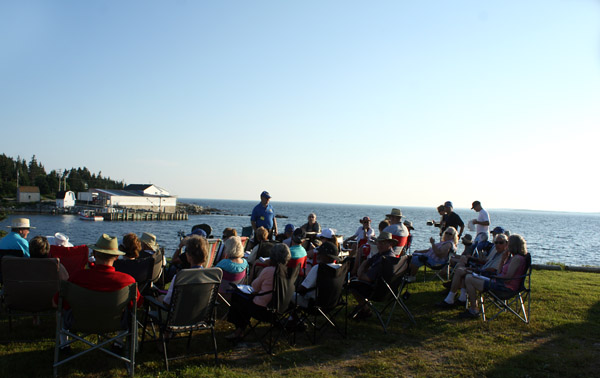
The group finds out about the next day’s leg of the journey at an evening seaside meeting.
From the “Never-Bored RVers,” We’ll see you on down the road.
© All photos by Barry Zander.
Because of the numerous Spam comments on this site, the comments section has been deactivated. Please email us at [email protected] and I will pass along your comments. Learn about Alaska and see travel photos at ontopoftheworld.bz (and much more to come when time allows).